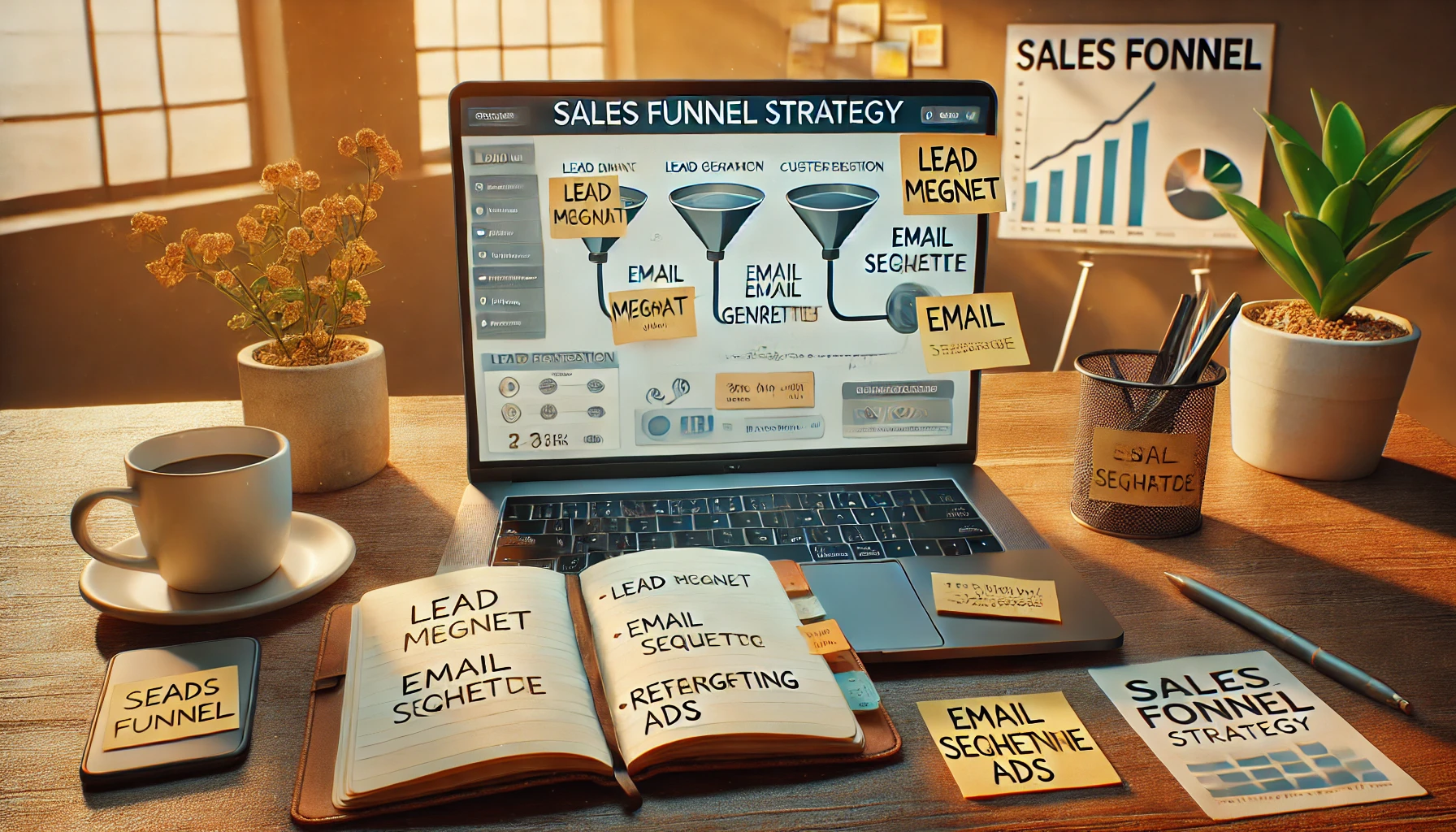A sales funnel is a structured process that guides potential customers from awareness to purchase. Without a well-optimized funnel, you risk losing leads and missing out on sales. A strong funnel helps you attract, nurture, and convert leads efficiently, leading to higher revenue and business growth.
In this guide, we’ll cover 10 essential steps to build a high-converting sales funnel that turns leads into loyal customers.
1. Understand the Stages of a Sales Funnel
A sales funnel consists of four key stages:
The Four Sales Funnel Stages:
📌 Awareness: The customer discovers your brand.
📌 Interest: They engage with your content or offerings.
📌 Decision: They evaluate your product/service.
📌 Action: They make a purchase.
📌 Example: A digital marketing agency might attract leads with a free SEO checklist (Awareness), send an email sequence (Interest), offer a consultation (Decision), and close the sale (Action).
2. Identify Your Target Audience
A sales funnel will only convert if it’s designed for the right people.
How to Define Your Ideal Customer:
✅ Identify their problems, goals, and pain points.
✅ Research where they spend time online.
✅ Create detailed customer personas.
📌 Example: A fitness coach targeting busy professionals can tailor content around quick workouts and time-saving meal plans.
3. Create an Irresistible Lead Magnet
A lead magnet is a free offer that encourages visitors to exchange their email or contact details.
Popular Lead Magnet Ideas:
🎯 Free e-book, checklist, or PDF guide.
🎯 Webinar or video training.
🎯 Discount or free trial.
📌 Example: A software company can offer a “30-Day Free Trial” to attract leads into its funnel.
4. Build a High-Converting Landing Page
Your landing page should capture leads efficiently without distractions.
Key Elements of a Strong Landing Page:
✅ A clear headline that highlights the benefit.
✅ A short form (name + email) to collect leads.
✅ A strong CTA (e.g., “Get Your Free Guide Now!”).
📌 Example: A real estate agent can create a landing page offering a free “Home Buying Checklist.”
5. Use Email Sequences to Nurture Leads
Once you capture leads, you need to build trust and guide them toward a purchase.
Effective Email Funnel Structure:
📩 Welcome Email: Introduce your brand and value.
📩 Educational Emails: Provide helpful tips or case studies.
📩 Sales Email: Offer a limited-time discount or consultation.
📌 Example: An online course creator can send a 5-day email series educating leads before pitching the course.
6. Offer a Low-Risk Entry Point (Tripwire Offer)
A tripwire offer is a low-cost product ($7–$50) that encourages leads to make a small purchase before committing to a bigger one.
Tripwire Offer Examples:
✅ $7 mini-course.
✅ $10 downloadable templates.
✅ $27 product sample.
📌 Example: A social media coach can sell a $9 “Instagram Growth Blueprint” as a tripwire before offering a $500 coaching package.
7. Use Retargeting Ads to Bring Leads Back
Not all leads convert immediately—retargeting keeps your brand top-of-mind.
Best Retargeting Strategies:
✅ Show Facebook & Instagram ads to visitors who didn’t buy.
✅ Send email reminders for abandoned carts.
✅ Offer exclusive discounts to hesitant buyers.
📌 Example: An e-commerce brand can retarget visitors with a 10% discount if they leave the checkout page without purchasing.
8. Add Social Proof to Build Trust
People trust real customer experiences more than sales pitches.
Ways to Use Social Proof:
📌 Display customer reviews and testimonials.
📌 Share case studies and success stories.
📌 Show trust badges (e.g., “500+ Happy Clients”).
📌 Example: A freelance web designer can feature before-and-after website redesigns to show real results.
9. Optimize the Checkout Process
A complicated checkout process reduces conversions.
How to Improve the Checkout Experience:
✅ Offer one-click checkout or guest checkout.
✅ Accept multiple payment methods (PayPal, credit card, Apple Pay).
✅ Remove unnecessary form fields.
📌 Example: A subscription box service can use one-page checkout to speed up the process.
10. Track Metrics and Continuously Optimize Your Funnel
A sales funnel isn’t static—it should be monitored and improved over time.
Key Metrics to Track:
📊 Conversion Rate: How many leads turn into customers?
📊 Bounce Rate: Are people leaving your landing page too soon?
📊 Cart Abandonment Rate: Why aren’t leads completing the purchase?
📌 Example: A business consultant noticing low email open rates might A/B test different subject lines.
Final Thoughts: Build a Sales Funnel That Works
A high-converting sales funnel helps businesses attract leads, nurture relationships, and increase sales on autopilot. By following these 10 steps, you’ll create a structured system that turns visitors into paying customers consistently.
🚀 Your Next Step: What’s your biggest challenge in building a sales funnel? Let me know in the comments!
